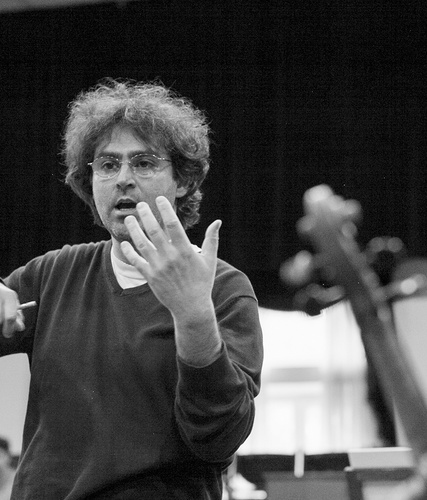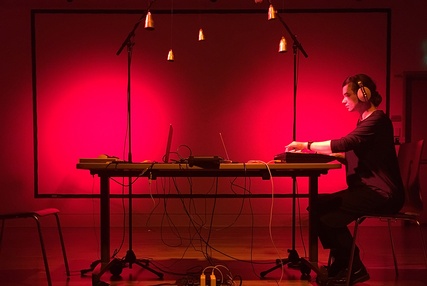« I am in blood » pour seize musiciens et électronique live
Un étouffement acoustique - les enjeux artistiques
I am in blood trouve son origine dans les événements parmi les plus dramatiques qui ont eu lieu en 2020 : les confinements dus à la Covid, mais aussi les violences policières aux États-Unis, et notamment les meurtres racistes perpétrés par la police, à commencer par celui de George Floyd. La mort de ce dernier a provoqué une série d’émeutes qui ont, en retour, poussé les autorités de certaines régions à instaurer la loi martiale – notamment celle de la baie de San Francisco où vit alors Carmine-Emanuele Cella.
Depuis près d’une dizaine d’années, Carmine-Emanuele Cella travaille sur une composition « hic et nunc » : « une musique que l’on ne peut pas jouer dans un lieu autre et à un moment autre que ceux pour lesquels elle a été conçue. »
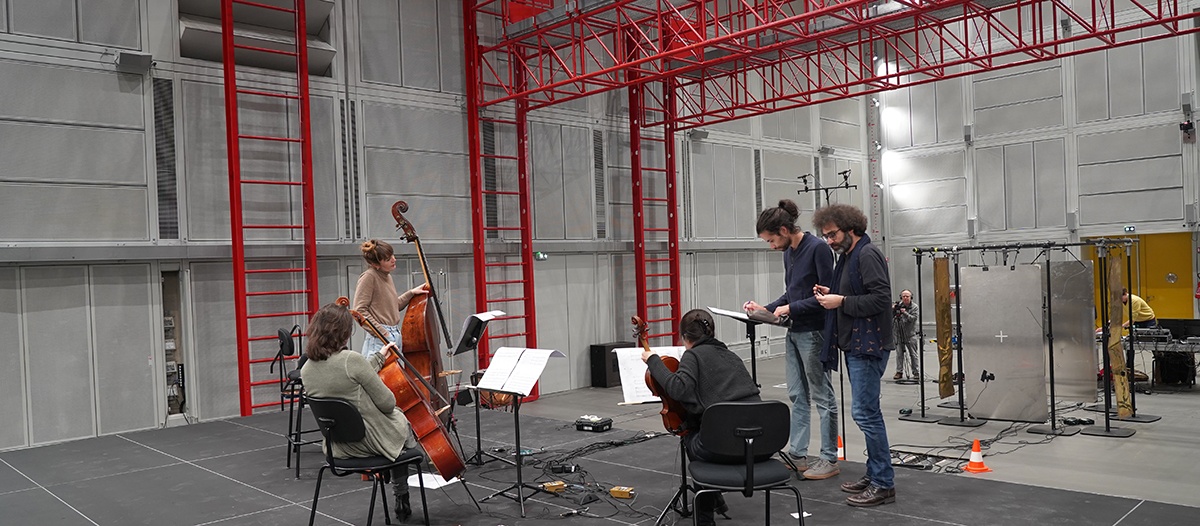
Carmine-Emanuele Cella en répétition avec l'ensemble L'Itinéraire et le chef Léo Margue, à l'Espace de projection © Ircam-Centre Pompidou, photo : Déborah Lopatin
Ce qui l’a amené naturellement à une réflexion sur la « présence » et la mise en contexte du public. L’idée est de ménager les conditions d’une « écoute intégrale » afin de véritablement faire « l’expérience » de la musique.
À bien des égards, I am in blood est donc le lieu d’une tentative : celle d’une musique qui recréerait un contexte acoustique propre à faire éprouver au public les sentiments d’enfermement du confinement et, plus encore, une impression d’étouffement – à l’instar de George Floyd pendant les dix longues minutes qu’a duré son agonie sous le genou de Derek Chauvin.
Celle, aussi, d’une musique qui s’interroge sur le comportement meurtrier de ce dernier : pourquoi ne s’est-il pas arrêté ? Ne se rendait-il pas compte de l’irréparable qu’il était en train de commettre ? Pourquoi est-il resté ainsi si longtemps ? Pensait-il qu’il était d’ores et déjà trop impliqué, trop compromis, pour faire marche arrière ? Était-il, de son côté, trop enfermé dans son propre comportement, dans ses propres actions et pensées, au point de ne plus être capable de s’apercevoir de ce qu’il faisait ? Et nous ? Sommes-nous, nous aussi, trop compromis par cette société pour ne plus pouvoir faire demi-tour ?
Un nouveau paradigme pour la spatialisation - les enjeux technologiques
I am in blood s’inscrit donc pleinement dans la démarche de Carmine-Emanuele Cella vers une musique « hic et nunc ». Un concept musical dans lequel la dimension spatiale est cruciale – puisque chaque œuvre est conçue spécifiquement pour l’espace dans lequel elle doit sonner. Notons au passage que le cycle d’œuvres au cours duquel Carmine-Emanuele Cella a développé cette réflexion s’intitule Les espaces physiques – la référence aux Espaces acoustiques de Grisey mise à part, ce titre signifie bien l’importance de la physicalité, voire de la charnalité, de l’expérience proposée au public.
En l’occurrence, dans I am in blood, les musiciens et instruments augmentés sont disposés tout autour du public, voire au-dessus de lui. Des plaques tonnerre, mises en vibration par des transducteurs via l’électronique (parfois par le jeu des musiciens eux-mêmes) forment comme un château de cartes, qui menace de s’écrouler à tout moment. « Ce sont autant d’épées de Damoclès suspendues au-dessus des têtes des spectateurs, remarque le compositeur. »
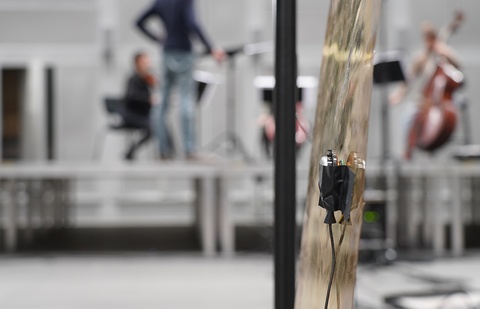
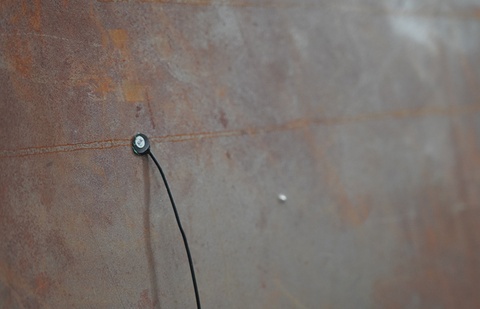
Répétition à l'Espace de projection, plaques tonnerre avec système électronique © Ircam-Centre Pompidou, photo : Déborah Lopatin
Le fait que la pièce sera créée à l’Espace de projection de l’Ircam, qui est comme on sait équipé d’un dôme ambisonique unique au monde (constitué de plus de 300 haut-parleurs), permet au compositeur d’aller plus loin encore dans sa pensée musicale de l’espace.
« Je connais depuis longtemps déjà les principes physiques et la technique de l’Ambisonics. Mais je n’avais encore jamais travaillé avec, dans le cadre de mon métier de compositeur. La spatialisation a toujours revêtu pour moi un aspect très critique et, n’étant pas convaincu par la virtualité de l’espace, j’ai jusqu’ici préféré le réel (le physique) au virtuel. »
« Cependant, avec I am in blood, j’ai voulu travailler sur une autre vision de la spatialisation, avec la coexistence d’espaces sonores multiples dans un même lieu – une idée propice à l’utilisation de l’Ambisonics. Les musiciens sont disposés en trois dimensions autour du public et la diffusion ambisonique permet elle aussi de simuler un espace en trois dimensions. L’idée étant bien sûr de faire dialoguer les deux. J’essaie donc de les répartir sur plusieurs espaces, parfois mouvants, dont des espaces physiquement impossibles. »
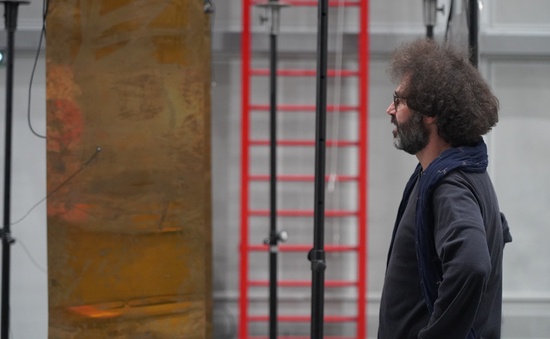 Des espaces impossibles, kézako ? « Ce sont par exemple des espaces non connexes : je peux diffuser le début d’un son dans une région de cet espace et la fin dans une autre, à l’autre bout de la pièce, qui ne lui est pas reliée “physiquement”. Je travaille ainsi sur plusieurs espaces fluides. »
Des espaces impossibles, kézako ? « Ce sont par exemple des espaces non connexes : je peux diffuser le début d’un son dans une région de cet espace et la fin dans une autre, à l’autre bout de la pièce, qui ne lui est pas reliée “physiquement”. Je travaille ainsi sur plusieurs espaces fluides. »
S’agissant de son propre usage de l’Ambisonics, Carmine-Emanuele Cella essaie tant que faire se peut de se détacher de tout a priori : « Mon sentiment, de manière générale, est qu’un outil d’informatique musicale tel que l’Ambisonics n’est justement que cela : un outil. Y avoir recours nécessite en amont l’élaboration d’une théorie compositionnelle de l’espace, afin de déterminer le paradigme spatial à l’œuvre dans la pièce, pour asservir ensuite l’outil à ce paradigme. C’est la raison pour laquelle je caresse en ce moment l’idée d’une extension du logiciel Orchidea (d’orchestration assistée par ordinateur) à la spatialisation, pour faire de la spatialisation assistée par ordinateur. »
« En l’occurrence, l’Ambisonics est un système d’encodage. Même si l’outil lui-même (la manière dont il a été conçu et utilisé jusqu’ici) présuppose un paradigme d’écriture, ce n’est pas en soi une écriture de l’espace. Je m’intéresse quant à moi plutôt à l’aspect physique de la spatialisation : plonger le public dans un lieu qui agit sur ses perceptions. L’écriture y dépend directement de l’espace. L’espace fait partie intégrante de l’écoute – il peut être un paramètre du contrepoint, de la polyphonie, du timbre… C’est-à-dire que le timbre est “réalisé” par l’espace dans lequel il se déploie. »
Carmine-Emanuele Cella en répétition à l'Espace de projection © Ircam-Centre Pompidou, photo : Déborah Lopatin
![]()
Précédents projets à l'Ircam
2013 – Reflets de l’ombre, pour grand orchestre et électronique live, entre 15 mn et 18 mn, Suvini Zerboni
2016-2017 – Inside-out, pour piano, trois percussionnistes et électronique, 19 mn, Suvini Zerboni
2019 – Atlas, a sound cartography of Europe, œuvre composée en association avec Dimitris Kamarotos et Valerio Tricoli.



